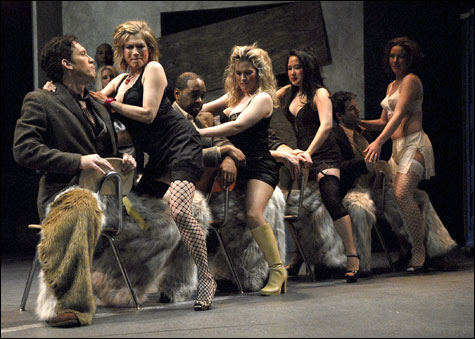
MODERN MORALITY PLAY: Mahagonny’s dog-eat-dog world is all too contemporary. |
With its production of the Kurt Weill/Bertolt Brecht Aufstieg und Fall der Stadt Mahagonny (“The Rise and Fall of the City of Mahagonny”), Opera Boston consolidates its position as this city’s most exciting opera company. Not every production, of course, is equally inspired, but who else is bringing us, along with Handel, Mozart, Donizetti, Verdi, and Bizet, such ambitious contemporary work as John Adams’s Nixon in China, Thomas Adès’s Powder Her Face, Peter Eötvös’s Angels in America, or, next season, Osvaldo Golijov’s Ainadamar? And audiences are flocking: Mahagonny sold out its run even before it opened.
Mahagonny might very well be the most ambitious of all. Richard Dyer described it in his program note as an “ironic, satirical, tragicomic opera-allegory — a modern morality play.” Denouncing the excesses of the Weimar Republic, it by extension shows us our own dog-eat-dog human disregard and communal greed. What could be more timely? There’s even a hurricane that wipes out “Pensacola” and an earthquake that “perishes” Benares. Mahagonny’s central moral? “In the whole human race, there is no greater criminal than a man without money.”
The powerful and unforgettable score includes two songs in English (this jolt to the 1930 Leipzig audience isn’t possible when the rest of the opera is also sung in English): the “Alabama-Song,” popularized by the Doors (“We’ve lost our good old mamma,/And must have dollars, oh you know why”), and “Benares-Song” (“Where is the telephone? Is here no telephone?”). There’s also the “Song of Mandalay” (sung by the urgently impatient customers of a bordello) and that memorable hymn to selfishness, “Denn wie man so bettet, so liegt man” (“In this world you must make your own bed,” in Michael Feingold’s consistently clunky English). Weill set some of Brecht’s deliberately “alienating” moralizations in the mode of Bach chorales; the chorus intones a fugue reminiscent of Mozart’s solemn Masonic chorus in Die Zauberflöte. And these lie cheek by jowl with Weill’s harmonically astringent tangos, waltzes, and Tin Pan Alley tunes that both mock and celebrate “bourgeois” pop styles.
In three long acts, Mahagonny makes heavy demands on both singers and orchestra (and audience). Although more tuneful than Berg, this score is not easier. This is only the third time the full-length work has been professionally staged here. Sarah Caldwell did it in 1974, and John Dexter’s Metropolitan Opera production turned up seven years later on a Met tour (there was also a student production at Harvard in the 1990s); Peter Sellars and Craig Smith did a stunning version, on a double bill with a Bach cantata, of the Mahagonny Songspiel, the six plotless numbers Brecht and Weill developed into the full opera. The current production opened just after the devastating “Glitter and Doom” show of Weimar Republic portraits closed at the Metropolitan Museum, and the Mahagonny program advertises the Cantata Singers’ upcoming “Kurt Weill Season.” Maybe it takes a world on the brink of disaster to show how necessary the art of this period is.